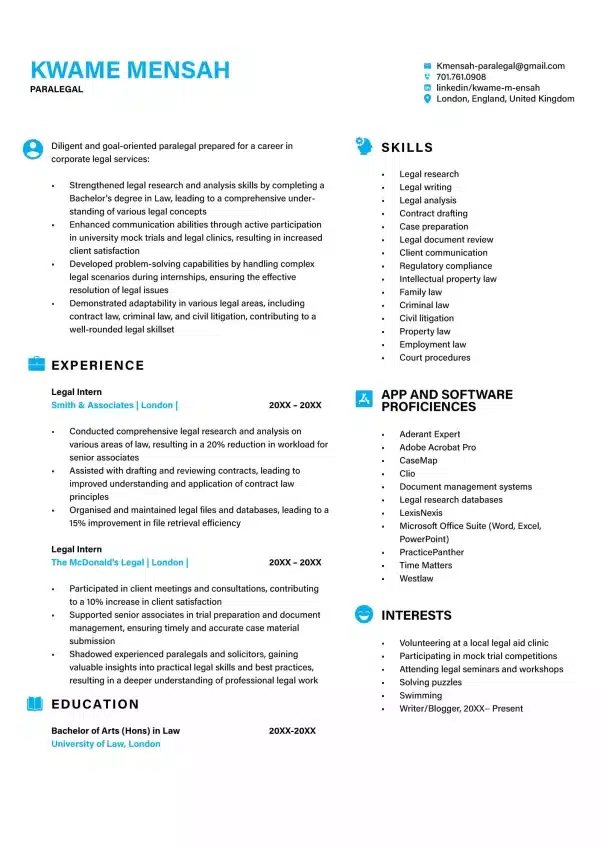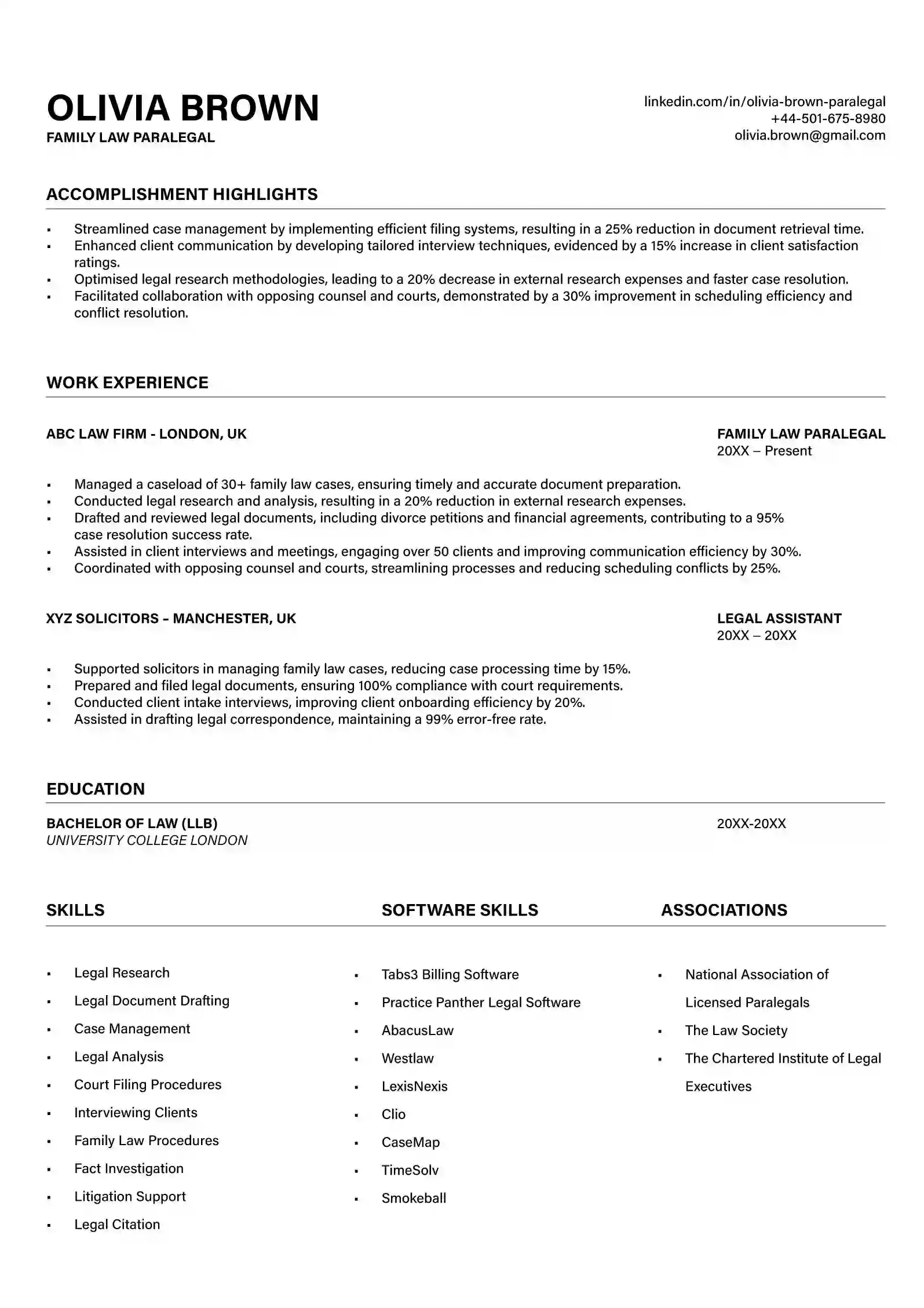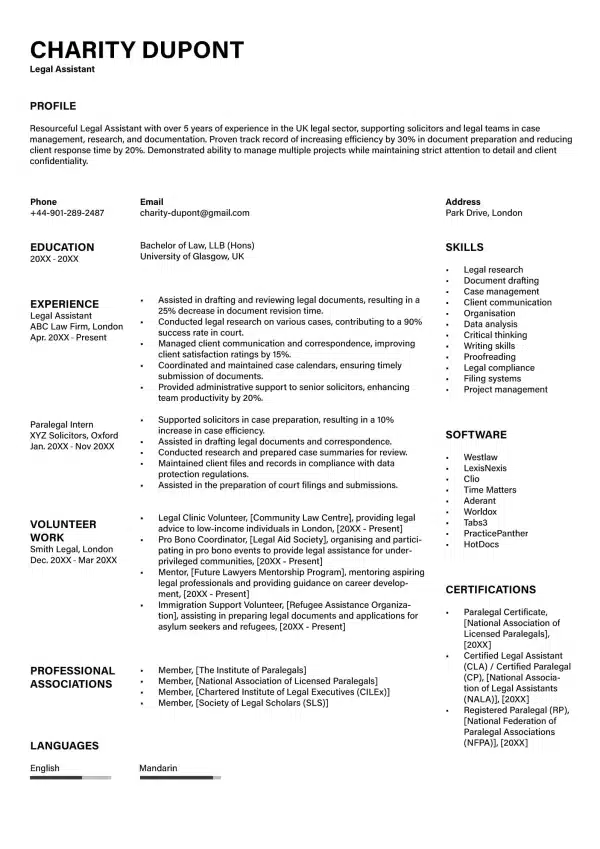Summary:
Always wanted to become a paralegal but don’t know where to start. There is an increasing demand for paralegals in the UK. With this guide, you can position yourself to land that paralegal job in no time.
Learn what paralegals do, how much they earn, how to become a paralegal UK, how to write a CV format of employment, and more.
Did you know that it takes seven years to become a lawyer? This includes four years of undergraduate study and three more years of law school.
If this sounds like much work, it is because it is. This is why more and more people take the paralegal route. Paralegals are a vital part of the legal system, often working alongside lawyers in an assisting capacity.
In the UK, it is an efficient way to enter the legal profession without undergoing all the back-breaking processes lawyers do.
But how exactly do you become a paralegal? Do you need a university degree?
Where do you work once you are qualified? How much do you earn?
This article looks closely at paralegal jobs and everything they entail.
What Is a Paralegal?
First thing first. What is a paralegal?
A paralegal is a valuable member of the legal industry who is not a qualified lawyer but has extensive knowledge about legal matters and the law.
Paralegals work alongside barristers and solicitors, offering various legal and organisational services.
Usually, they work in a supporting capacity within the public sector, law firms, or not-for-profit organisations.
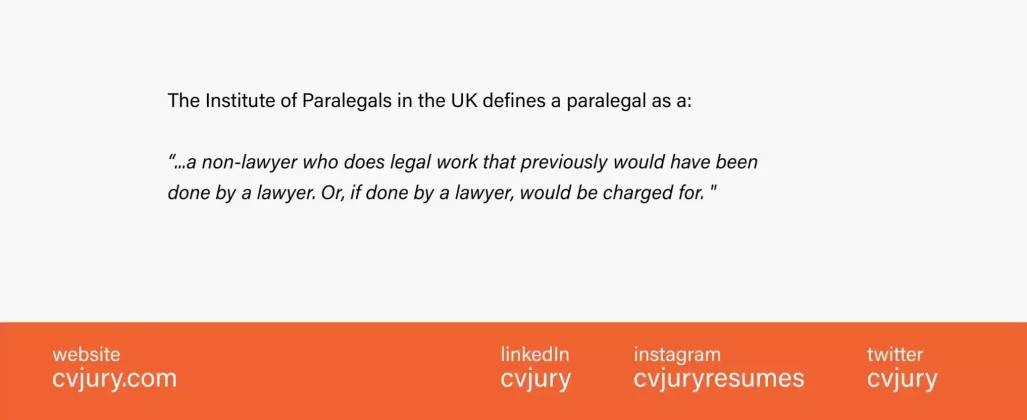
Paralegal jobs can be classified under different titles, including caseworker, clerk, legal executive, and legal secretary.
Some paralegals work toward becoming solicitors while others grow their experience to rise to the role of the senior paralegal in a particular field.
In the UK, licensed paralegals are associate members of the Chartered Institute of Legal Executives (CILEx).
What Do Paralegals Do?

You now know what a legal executive is. But you may be fuzzy on the details about what they do. So, what job does a paralegal do?
The paralegal profession involves many tasks. Some are administrative tasks, while others include client consultation, project management, and legal research.
On a typical day, paralegals do the following:
- Assist lawyers in court cases
- Create and organise legal documents and case files
- Perform legal research on laws and jurisprudence related to specific cases
- File paperwork and attend court hearings involving small claims cases
- Respond to emails and correspondence and meet client needs
- Write case reports and other legal documents
- Meet with clients, claimants, and experts
- Compile relevant documents for court cases and process legal information
- Handle confidential documents
- Draft primary letters and primary documents for mortgages, sale agreements, etc.
- Interview clients and witnesses
- Perform administrative tasks like filing, billing, and letter writing
- Give clients essential legal advice
- Track the legal proceedings of active and assigned cases
- Present applications to judges
What Can Paralegals Not Do?
While legal secretary tasks are extensive, there are some things that a paralegal working for a UK law firm cannot do. These are called reserved activities and can only be performed by lawyers. They include:
- Transferring land
- Representing clients in court
- Performing probate activities
- Conducting litigation
- Administering oaths
What Is the Paralegal UK Salary?
- Starting Salary – £14,000
- Highest Salary – £55,000
What Is Involved?
A paralegal career is less lucrative than a lawyer, but the pay is good. Paralegals in the UK earn an average salary of £25,000 a year.
Entry-level paralegals get £14,000, with more experienced paralegals earning more. For senior paralegals, the annual salary can be as high as £50,000.
Of course, how much you earn as a legal executive will depend on several factors. These include
- your paralegal qualifications
- the location of the law firm, and
- the area of practice
Some paralegals work as freelancers for a legal team, raking in between £60 to £260 a day.
Do You Need a Law Degree to Become a Paralegal?
You might think paralegals are all law graduates, but this is far from the truth. You do not need to have a degree to become a paralegal.
While it is one way to go and could certainly increase your desirability to employers, it is not the only path to a paralegal career. Many paralegals still need to get a degree.
Steps on How to Become a Paralegal in the UK
So how do you become a paralegal?
You can enter the legal field as a legal secretary in several ways. Choosing your career path will depend on how you learn best, your resources, and how much time you are willing to spend outside the workforce.
Here is a look at the different paths to a paralegal job.
1. University Degree
One obvious and straightforward way to become a paralegal is to take a university-level paralegal course.
You can base your career on a law degree, or you can do a non-law course for your undergraduate studies and then take the Graduate Diploma in Law (GDL).
If you aspire to become a solicitor someday, you can follow this up with the Legal Practice Course (LPC).
Many UK universities offer formal paralegal courses, so much so that your options are limitless.
You can study for a Higher National Diploma or degree in law, paralegal practice, legal studies, or a foundation degree.
You can also look into the multiple CILEx qualifications available for legal secretaries.
But while going the university route can increase your employability, it is a challenging route, and you must meet the following requirements to get started:
- 2 to 3 A-levels or the equivalent of a law degree
- 1 or 2 A-levels or the equivalent for an HND or foundation degree
2. College
You can take a college course if you are not one for university lectures but still prefer the academic route.
Always confirm that the Institute of Paralegals recognises the qualification offered by the college you are considering.
Your options here include the following:
- NALP Level 3 Certificate in Law and Practice
- CILEx Level 3 Certificate in Law and Practice
- Level 2 Diploma in Legal Studies
To qualify for these college courses, you will need to meet the following requirements:
- Level 2 Course: 2 or more GCSEs in grades 9 to 3 (A to D) or the equivalent
- Level 3 Course: 4 or 5 GCSEs in grades 9 to 4 (A to C) or the equivalent
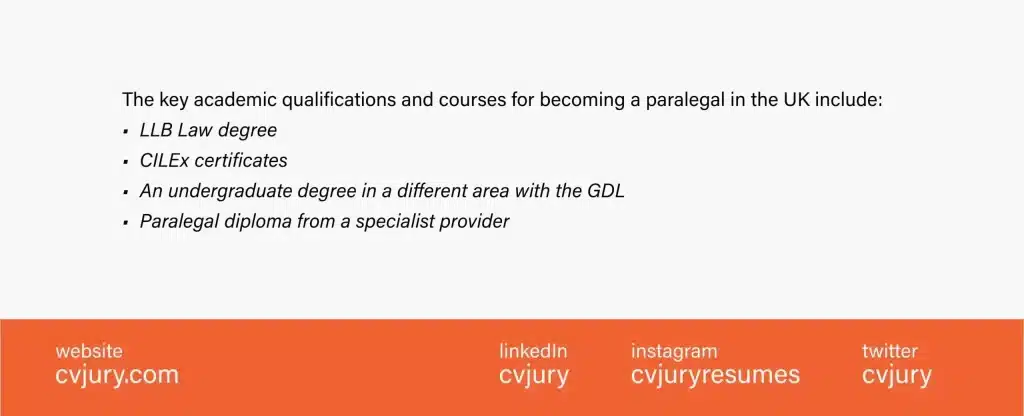
3. Apprenticeship at a Legal Practice
Alternatively, you can sign up for a paralegal advanced apprenticeship program. Apprenticeship is one of the most popular ways to become a legal secretary.
It combines academic learning with practical training to develop a well-rounded approach to the field. In the UK, legal executive apprenticeship is a Level 3 qualification equivalent to A-levels.
But why would you choose an apprenticeship as a route to a legal executive job?
An apprenticeship program puts you in the thick of the action. It gives you hands-on experience, allowing you to work and learn under the supervision of accomplished legal professionals. You get the chance to:
- Conduct legal research
- Write and review legal documents.
- Help the legal team open, progress with, and complete certain cases
- Correspond with clients
During your apprenticeship, you will also get paid for the legal work you do for the firm. You may even qualify for a permanent position once you pass the program.
Generally, the paralegal apprenticeship system in the UK does not feature set requirements for interested candidates. Most employers set their entry requirements.
You should at least have Math and English GCSEs and two A-level grades (C or above).
4. Work Experience
Lastly, you can choose to dive directly into legal work.
Also called workplace learning, becoming a paralegal through work experience involves signing up as an admin assistant at a legal firm and learning on the job.
You skip all the academic qualifications and undergo on-the-job training to gain legal experience.
Usually, this route takes longer because you have to start at the bottom and work your way up the legal industry.
But it is best if you want to change your career or just graduated and start working immediately.
This way of becoming a paralegal is widely recognised across the UK. You can apply for a work training position through the National Association of Licenced Paralegals or the Institute of Paralegals.
Depending on your career plans, you can look for paralegal work at commercial law firms, not-for-profit organisations, the local government, charities, and more.
As with apprenticeships, most employers will set their requirements for job training. Nonetheless, you may need good English skills and A-level grades or GCSEs.

What Are the Key Skills for A Paralegal UK CV?
You now know how to get the knowledge and experience to become a paralegal in the UK. But you need a lot more than formal qualifications. A successful career in the field requires some skills.
Paralegals are legal professionals who work alongside lawyers, solicitors, and barristers, assisting with legal tasks like interviewing clients and preparing legal documents.
To do this job well, you will need the following soft skills to beef up your CV for paralegal:
- Written and verbal communication skills
- Analytical skills
- Administrative knowledge
- Interpersonal skills like discretion and empathy
- Collaboration
- Problem-solving skills
- Organisational skills
- Research skills
How Long Does It Take to Become a Paralegal?
As we have already established, becoming a paralegal in the UK does not involve many hard and fast rules. This is especially true for your route to get a paralegal job.
Similarly, how long it takes to start your career path will depend on your course. Some people will have paralegal jobs in 24 months, others in three years.
Here are some estimations to help you plan your career:
- Level 3 Paralegal Practice Award – 3 to 4 months
- Level 3 Legal Secretarial Certificate in Practice – 6 to 8 months
- Level 3 Paralegal Practice Diploma – 9 to 12 months
- Level 4 Diploma in Paralegal Studies – 12 to 14 months
- Level 7 Diploma in Practice – 6 to 8 months
How Much Does It Cost to Become a Paralegal?
Besides time, another common concern among many law graduates is student bills.
Figuring out how much becoming a paralegal costs is a smart thing to do initially because it helps you plan. According to the National Association of Licensed Paralegals, you can expect the following:
Level 3 – Paralegal Studies
- Single Unit – £250
- Award – £450
- Certificate – £770
- Full Diploma – £1190
Level 4 – Practice
- Single Unit – £250
- Part One – £750
- Part Two – £750
- Full Diploma – £1380
Paralegal Qualification
- Single Unit – £475
- Postgraduate Diploma – £1660

Are Paralegals in Demand in UK Law Firms?
But what is the point of all of this? Is anyone hiring paralegals?
According to statistics, yes.
Legal secretaries are in great demand in the UK and the US. For example, the U.S. Bureau of Labor Statistics data shows that the field is bound to grow at a 14% rate between 2021 and 2031, creating even more paralegal positions.
The recent pandemic and increase in workplace injuries have also raised the demand for legal services in the personal injury law sector. You have a very high chance of becoming a paralegal once you qualify.
Where Can You Work as A Paralegal?
And where exactly are these paralegal positions?
Well, there are many places where paralegals play a crucial role in legal operations. You can work in large, mid, small, and niche law firms depending on your aspirations.
You can also be part of in-house legal teams at a large company or enter the public sector in organisations like the national government, local councils, the Metropolitan police, or the Crown Prosecution Service.
The opportunities for paralegal work are endless.
How to Become a Recognised Professional Paralegal
And once you do get that job, you will want employers to take you seriously.
You can achieve this by joining the Institute of Paralegals. All successful law students, lawyers, and other legal professionals worth their salt are members of a nationally or internationally-recognised professional body.
By joining the IOP, you become one of them. You are telling current and future employers that you are committed to your field’s highest standards and ethics and developing and updating your skills.
The IOP has the following four career path steps:
- Affiliate member
- Associate Paralegal
- Qualified Paralegal
- Fellow of the IOP
An IOP membership will do wonders for your legal executive CV. This internationally-recognised status will open many career doors for you.
CV for First Job Template – Trainee Paralegal
Now all that is left is to insert all your skills and experience into a stellar paralegal CV. Here is a template you can use to model your UK resume:
Examples of CV for Jobs – Paralegal UK Curriculum Vitae
Even better, here are some sample paralegal CVs for different candidates. You can use them to figure out the language and structure of your CV.
If you want the Word version of any of these four CV templates, contact us at help@deltaprofits.com to get a free copy:
How to Become a Paralegal UK—Key Points
By now, you know everything there is to know about becoming a legal executive. Here are some points you should keep in mind as you go forward:
- Paralegals are a crucial part of the legal system. They work in law firms and other companies in an assisting capacity alongside lawyers, solicitors, and barristers.
- Paralegals handle legal information, research, correspond with clients, and perform other firm administrative tasks.
- There are multiple ways to become a legal executive. You can get a university paralegal’s degree, go to college, join an apprenticeship, or learn on the job.
- Whichever route you choose, ensure it is recognised in the UK to ensure your employability.
Start Your Paralegal Journey Today
Paralegals are the beating heart of the legal society.
Lawyers and solicitors may seem like they do all the heavy lifting. But legal executives are on the ground daily, taking witness statements, drafting legal documents, providing sound legal advice, and more.
And you know what? There is no reason you cannot join this rank of legal elites.
It might seem like a lot – the many options for becoming a paralegal, the many places you can work, the professional societies you need to join.
But, with some time and effort, many people have become the best paralegals in this field.
Start by picking your poison – university, college, apprenticeship, or work. Then, work on gaining some experience in your field of choice, and in a few years, you will become a paralegal extraordinaire.
Remember, paralegals are a valuable part of the legal sector, and paralegals are in high demand in the UK. So, employers will be banging on your door to hire you once you work.
So polish that CV and get started on the discussed ways—how to become a paralegal in the UK. Join the elite club of paralegals today since the legal sector awaits.



